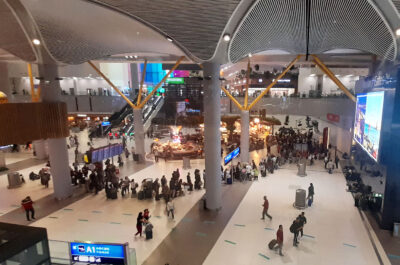New analysis from Frost & Sullivan, Global Airport Passenger Screening Market, finds while the threat of terrorism continues to be the most influential market driver; efficient checkpoint processing is in high demand by airports to reduce traveler wait times. Airports seek more automation and quicker screening processes to enhance traveler experience, finds Frost & Sullivan.
MOUNTAIN VIEW, CALIF. – Automation and pre-processing are reducing the physical interaction with travelers during airport passenger screening. This is the first step toward a future in which the passenger screening process will become unintrusive. An assortment of portal scanners, biometric collection devices, and pre-clearance based on voluntary background investigations will transform the passenger screening process.
New analysis from Frost & Sullivan, Global Airport Passenger Screening Market, finds while the threat of terrorism continues to be the most influential market driver; efficient checkpoint processing is in high demand by airports to reduce traveler wait times. As a result, the global spending on passenger screening technologies, which stood at $1.42 billion in 2014, expects to reach $1.63 billion in 2020.
According to a recent passenger forecast released by the International Air Transport Association (IATA), the number of global annual airline passengers will reach 7.3 billion by 2034, more than double from the 3.3 billion reported in 2014.
“To deal with the escalating passenger traffic, airports need to implement swifter and more efficient methods of passenger screening,” said Frost & Sullivan Aerospace & Defense Senior Industry Analyst John Hernandez. “One solution could be to supply passengers with alternate venues and automated tools to prescreen them before they arrive at the airport.”
Screening technologies enhance passenger processing, but the technology is only as efficient as those operating it. A risk-based approach to security was established to speed up the screening process, wherein screeners would focus on travelers who are perceived to present a security threat. However, accelerating the passenger screening process has been met with resistance from officials who believe it lessens the effectiveness of checkpoint operations.
Identifying high-risk passengers is only one element of establishing a more efficient airport passenger screening operation. For a more thorough system, airports are looking for innovative technologies capable of screening a large number of people quickly and accurately. Additionally, deploying scanners than can detect nonmetallic improvised explosive devices will also be imperative.
“Airports already employ automated systems such as automated passport control kiosks and automated border control, eGates, for international travel,” observed Hernandez. “The next step is to transition automated passenger screening to airport checkpoints. Equipment maintenance and recurring training will be critical selling points to agencies responsible for procurement.”
Global Airport Passenger Screening Market is part of the Aerospace & Defense Growth Partnership Service program. Frost & Sullivan’s related studies include: Rapidly Evolving Defense Markets, Global Military Aircraft Maintenance, Repair, and Overhaul (MRO) Market, US DoD 2016 Budget Assessment and The Global Distribution Systems (GDS) Market. All studies included in subscriptions provide detailed market opportunities and industry trends evaluated following extensive interviews with market participants.
Global Airport Passenger Screening Market – Infographic
Global Airport Passenger Screening Market
Theodore is the Co-Founder and Managing Editor of TravelDailyNews Media Network; his responsibilities include business development and planning for TravelDailyNews long-term opportunities.



























































































































































































